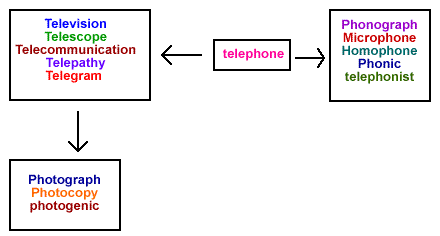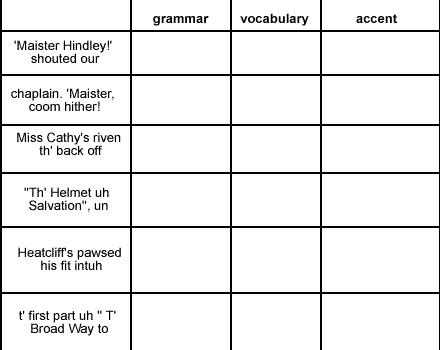




|
Literacy problems to solve for Key Stage 1, 2 and 3
What am I??
| cat
what am I if my first is ‘f’
|
bun
what am I if my last is ‘t’
|
| fat
what am I if my last is ‘n’
|
but
what am I if my first is ‘h’
|
| fan
what am I if my middle is ‘u’
|
hut
what am I if my middle is ‘a’
|
| fun
what am I if my first is ‘b’
|
hat
what am I if my first is ‘c’
|
Morpheme web A morpheme is the smallest unit
of meaning in a word. E.g. telephone – tele means far off, phone
means sound. So a telephone is something that gives us a sound from
far off. You can create a web of words by using the morphemes to make
more words.

Now you try. How many connections can you make from the word –
subject (ject –throw, sub – under, or to be under the control
of).
Or why not try one of these; tele/graph, micro/scope, herb/ology,
How many syllables
How many words can you create using these syllables? Once you have
made your words check in the thesaurus to find other similar words.
You might want to print off this sheet and cut it up so that you can
move the syllables around.
| try |
pill |
pen |
| pol |
ow |
ver |
| ish |
ar |
en |
| pet |
re |
joy |
| rol |
row |
ful |
| car |
sun |
play |
| gar |
set |
cil |
| den |
mon |
lem |
| win |
day |
on |
| dow |
o |
age |
Exploring dialect
Writing in dialect
Most of you will hear a local dialect spoken almost every day,
whether by your friends or your parents or on television. But it's very
unusual to see writing in a local dialect: almost all writing is in
Standard English. Sometimes you see conversation in novels that is written
in dialect, and you sometimes see poetry or jokes written in dialect.
This extract from Emily Brontë's novel Wuthering
Heights uses local dialect for one of the characters, Joseph, who
is a sour tempered old servant:
We made ourselves as snug as our means allowed in
the arch of the dresser. I had just fastened our pinafores together,
and hung them up for a curtain; when in comes Joseph, on an errand
from the stables. He tears down my handywork, boxes my ears and croaks:
'T' maister nobbut just buried, and Sabbath nut oe'red und t'sahnd
uh't gospel still i' yer lugs, and yah darr be laiking! shame on ye!
sit ye dahn, ill chiler! they's good books eneugh if ye'll read 'em:,
sit ye dahn and think uh yer sowls!'
Saying this, he compelled us to square our positions that we might
receive, from the far off fire, a dull ray to show us the text of
the lumber he thrust upon us.
I could not bear the employment. I took my dingy volume by the scroop,
and hurled it into the dog-kennel, vowing I hated a good book.
Heathcliff kicked his to the same place
T hen there was a hubbub!
'Maister Hindley!' shouted our chaplain. Maister, coom hither! Miss
Cathy's riven th' back off 'Th' Helmet uh Salvation', un Heathcliff's
pawed his fit intuh t' first part uh ''T' Broad Way to Destruction''!
It's fair flaysome ut flaysome ut yah, let 'em goa on this gait. Ech!
th' owd ud uh laced 'em properly - bud he's goan!''
- Practise reading the passage aloud. Try to show Joseph's strong
Yorkshire accent, but also his anger and outrage at the children's
behaviour.
- Do you think the passage benefits from using local dialect for Joseph's
speech? What would be the difference if Joseph spoken in Standard English?
Accent vocabulary or grammar?
Regional dialects differ from Standard English in three ways:
- in their accents, i.e. the same words sound different
- in their vocabulary, i.e. there are some different words
- in their grammar i.e. some words are formed and used differently.
In the table below Joseph's
first speech has broken down to show which part of the dialect are accent,
vocabulary or grammar.
Work with a partner to explain
why each of the words has been put in the accent, vocabulary or grammar
column. For example:
- nobbut is
in the vocabulary column because it is a local word that is being
used instead of the Standard English words only.
- T' is in the accent column
because it is the same word as the in Standard English,
but it is pronounced differently.

- Work with a partner to complete the table below for Joseph's second
speech.
- Compare your columns with another pair of pupils. Do you have the
same answers? Explain to each other why you have chosen each column.

Wordswork was from
North East Lincolnshire's Literacy Team |





|













